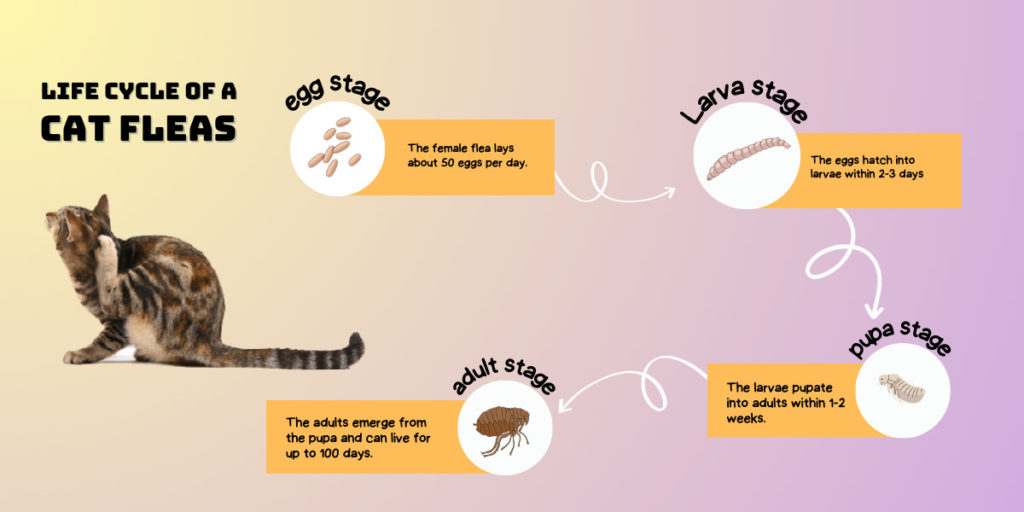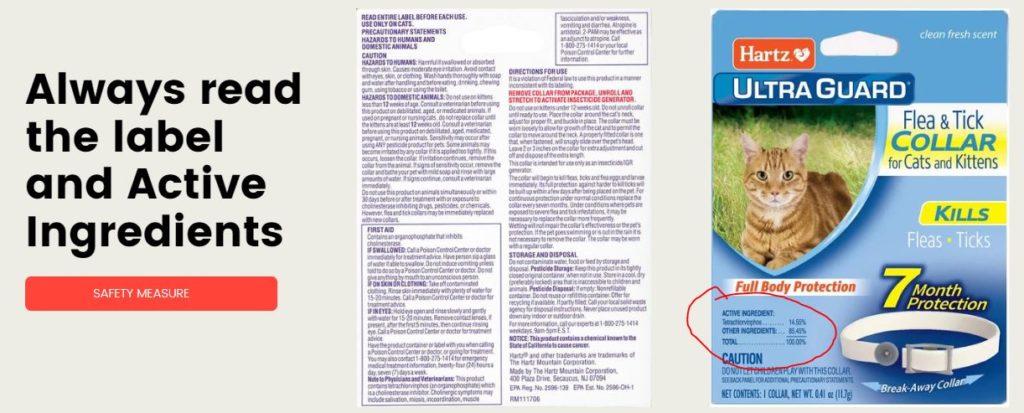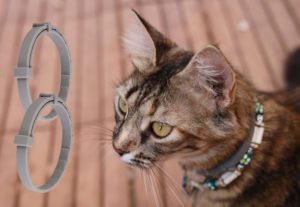A cat flea collar is a practical device designed to be worn around your cat’s neck. It works by either killing or repelling fleas and, in some cases, preventing flea eggs and larvae from developing, thereby interrupting the flea life cycle.
Do Cat Flea Collars Work?
Fleas are not only bothersome but can also pose serious health risks to your cat, including itching, irritation, allergies, anemia, and the transmission of diseases. If your cat suffers from flea infestations, you might be looking for all possible options. Among many options like Cat Dry Shampoo for Fleas, Shaving a Cat to Get Rid of Fleas, cat flea collar is easiest solution.
A cat flea collar operates by releasing insecticides or repellents that either kill or deter fleas from biting your pet. Some collars even contain ingredients that disrupt the flea life cycle, preventing re-infestations. While flea collars can be effective in controlling fleas on your cat, their efficacy varies depending on factors such as type, brand, ingredients, and duration of use.

How Do Flea Collars Work on Cats?
There are two primary types of cat flea collars: insecticidal and repellent. Insecticidal collars contain chemicals that eliminate fleas upon contact or when they attempt to bite your cat. On the other hand, repellent collars use natural or synthetic substances to deter fleas from your cat’s body.
Insecticidal collars release their active ingredients slowly and consistently over several months, with the active substances being absorbed by your cat’s skin and hair, forming a protective barrier. Some of these collars also include growth regulators that impede flea eggs and larvae from maturing into adults.
Repellent collars function by emitting scents or electric charges that fleas find unpleasant, discouraging them from approaching or remaining on your cat. Although repellent collars may not kill fleas outright, they can significantly reduce bites and the risk of infestation.
Are Flea Collars Effective for Cats?
Determining the effectiveness of flea collars depends on various factors, including the specific collar you choose and your cat’s individual needs. It’s essential to select a collar that suits your cat’s unique circumstances.
Collars like the Seresto Flea & Tick Collar for Cats and the Hartz UltraGuard Flea and Tick Collar for Cats can provide excellent protection when used correctly.
However, it’s important to remember that flea collars are just one component of a comprehensive flea prevention plan.
Effective flea control also involves treating your home and environment to eliminate potential sources of infestation.
Are Flea Collars Safe for Cats?
The safety of flea collars for cats hinges on choosing the right product and following usage instructions diligently. Some flea collars contain ingredients like permethrin, amitraz, or organophosphates, which can be toxic or harmful to cats, potentially causing skin irritation, neurological issues, seizures, or even death.
To ensure the safety of your cat, always read the label and choose a flea collar that is explicitly designed for cats and approved by regulatory agencies like the Environmental Protection Agency (EPA) or the Food and Drug Administration (FDA). Additionally, check the collar’s expiration date and replace it as recommended by the manufacturer.

Furthermore, it’s crucial to monitor your cat for any signs of adverse reactions, such as excessive scratching, redness, swelling, hair loss, vomiting, diarrhea, lethargy, or odd behavior. If any of these symptoms arise, remove the collar immediately and consult your veterinarian.
3 Best Cat Flea Collars
If you are looking for a good flea collar for your cat, here are some of the best options available on the market:
Hartz Plus UltraGuard Flea & Tick Collar for Cats

Type: Insecticidal
Pros
- Kills fleas and ticks on contact
- Prevents re-infestations for up to seven months
- Has a fresh scent and a reflective strip
- Adjustable and water-resistant
- Has a breakaway feature for safety
Cons
- Contains TCVP, an organophosphate that can be toxic or harmful to cats
- May cause allergic or sensitive reactions in some cats
- May lose effectiveness over time due to exposure to water, sunlight, heat, or dirt
Seresto Flea & Tick Collar for Cats

Type: Insecticidal
Pros
- Kills fleas and ticks through contact
- Prevents re-infestations for up to eight months
- Contains imidacloprid and flumethrin, two ingredients that work together to paralyze and kill parasites
- Has a patented polymer matrix that releases the active ingredients slowly and continuously
- Odorless and non-greasy
- Has a breakaway feature for safety
Cons
- May cause mild skin reactions or hair loss at the application site in some cats
- May be expensive compared to other collars
- May interfere with other collars or devices that your cat wears
ShengKou Flea and Tick Collar for Cats

Type: Insecticidal
Pros
- Repels fleas and ticks using natural ingredients such as citronella, lavender, and peppermint oil
- Does not contain any chemicals or pesticides
- Safe and eco-friendly
- Has a pleasant smell and a soft texture
- Adjustable and waterproof
- Lasts for up to six months
Cons
- May not kill fleas, only repel them
- May not be effective enough for severe infestations
- May not be suitable for cats that are allergic or sensitive to the natural ingredients
- May not be liked by cats that are picky about smells or textures
Conclusion
In conclusion, while flea collars, can be effective in addressing persistent flea infestations in cats, selecting the right collar and following safety guidelines are paramount. Always prioritize your cat’s well-being and consult your veterinarian for guidance in choosing the safest cat flea collar for your beloved feline companion. By doing so, you can provide your cat with a comfortable, flea-free life and ensure a healthier environment for both of you.
With a passion for cats and years of experience in cat care and grooming, I have gained valuable insights and expertise that I want to share with other cat lovers. I believe that every cat deserves the best care possible, and through this platform, I aim to empower cat owners like you to provide the utmost love and care for your feline companions.



